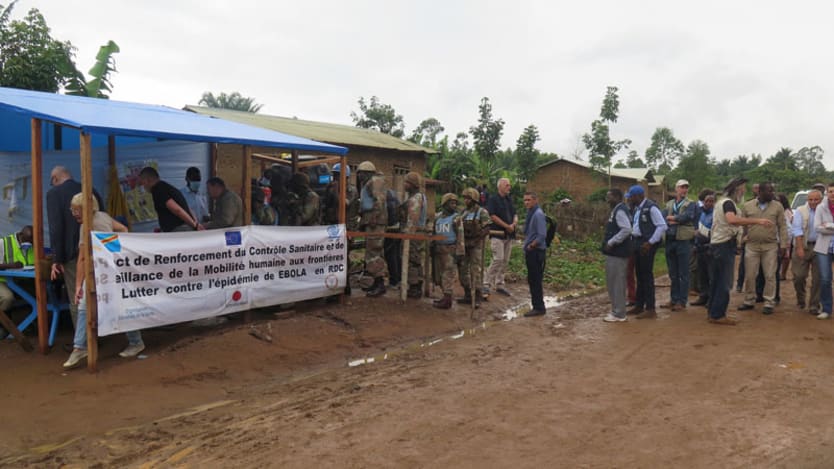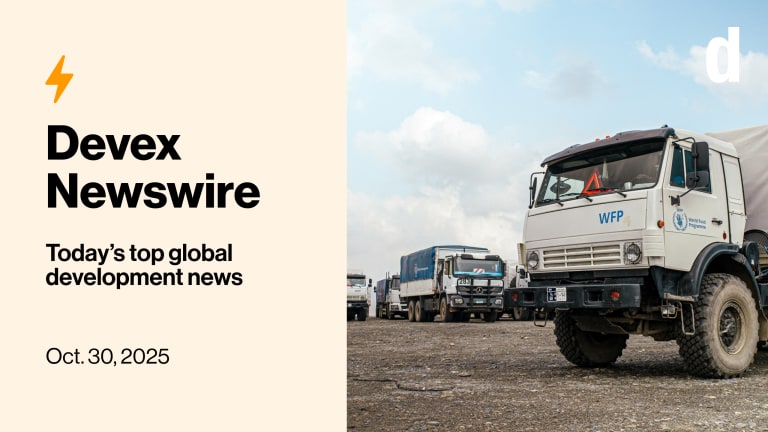
ABIDJAN — As the Democratic Republic of the Congo’s health ministry describes the ongoing Ebola outbreak as the worst the country has experienced, its neighbors remain on high alert for the risk of the virus spreading across the border.
As an Ebola outbreak in DRC gathers pace, neighboring countries are preparing for the risk that the highly-infectious virus could hit them too. This story explores the preparations in Rwanda and South Sudan. Read more about the situation in Uganda.
Since the outbreak was declared on Aug. 1, a variety of factors have stifled the efforts of local responders to prevent transmission, including the proximity of the outbreak to the Congo River and access restrictions in conflict-affected areas.
As of Nov. 19, the death toll had surpassed 200, with 326 confirmed cases. The World Health Organization has given the all-clear to alerts that have been raised so far by neighboring countries. Still, preparedness activities are being implemented in nine surrounding nations, with Burundi, Rwanda, South Sudan, and Uganda earmarked as top priorities for preventative support.
“More than anything else, communication is a key part in preventing and containing Ebola.”
— Olivia Headon, South Sudan spokesperson, International Organization for Migration“The prevention stage is the most critical to prevent ... the spreading of the outbreak ... [but] we are very much preparing in case the preventive stage flips to response,” explained Olivia Headon, South Sudan spokesperson at the International Organization for Migration.
The U.N. migration agency has focused its efforts on border screenings, water, sanitation and hygiene, and displacement tracking. To date, IOM has screened more than 21,600 people at seven border points in South Sudan, with no alert cases found, Headon confirmed. It is also rehabilitating the water system at a local health clinic, and tracking migration trends across the border.
Interagency response in South Sudan has boosted the country’s Ebola prevention efforts and improved response capabilities. Earlier this month, a high-level coordination meeting of U.N. agencies and other humanitarian partners led to the formation of a strategic advisory group whose purpose is to provide technical support to the Ebola national task force in areas such as surveillance, risk communication, psychosocial support, rapid response, and safe and dignified burials.
“The government and humanitarian community are far more prepared now for an Ebola outbreak than they were before the North Kivu outbreak [because] screening points and referral pathways have been established,” Headon added. The challenge now, she said, is funding. As of Nov. 10, $7.3 million had been mobilized in South Sudan, representing 45 percent of the total required for comprehensive preventative activities there.
In Rwanda — another priority country with a border just 150 kilometers from the North Kivu outbreak — a national Ebola contingency plan was created in August by the Rwandan Ministry of Health, with the aim of identifying areas for technical support and financial contribution from international partners. The plan spans a six-month period through January 2019 for the 11 districts considered most at-risk, including the capital city of Kigali.
Up to 60,000 people cross the Rwanda-DRC border for trading and personal activities each day, bringing a high risk of cross-border transmission, according to the Rwanda Red Cross Society. A national rapid response team is meeting weekly to monitor updates and coordinate strategies. The local Red Cross, for example, has been tasked with community contact tracing, risk communication, safe and dignified burials, and psychosocial support, among other activities. It has also carried out simulation exercises in Rubavu, the territory considered most at risk of an outbreak.
Since Rwanda has never experienced Ebola, “the impact is expected to be worse in case of an outbreak,” the organization warned in its latest preparedness update, with “high population density is also a risk factor making awareness campaigns ... essential.” Rwanda Red Cross has partnered with the Rwandan Ministry of Health to produce radio shows and broadcasts on Ebola. It has also printed more than 1300 posters to distribute in priority areas and supported mobile cinema sessions.
In South Sudan, Headon agreed. “One remaining challenge has been that people don’t understand why they have to wash their hands with chlorinated water, and if they don’t understand, they are not invested [in doing it],” she explained. “Therefore, more than anything else, communication is a key part in preventing and containing Ebola.”
While an Ebola vaccine awaits approval, it has already been deemed “effective” and “safe” by a WHO-led study. Vaccination of health and frontline workers at priority sites in Uganda began on Nov. 7, and preparations are underway for similar preventative vaccinations in Rwanda and South Sudan.








